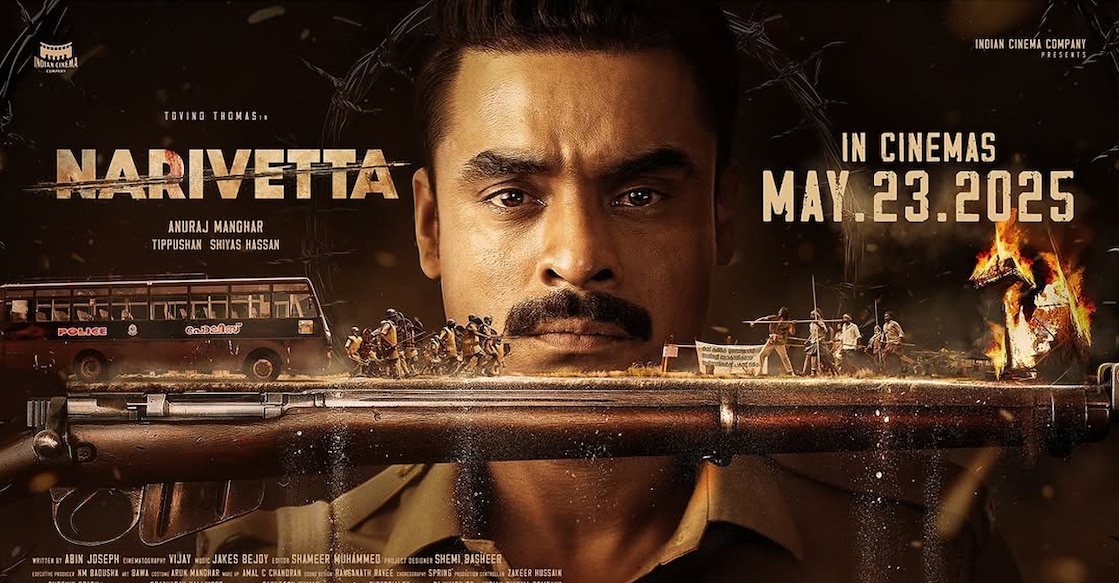'Narivetta': This Tovino Thomas starrer is a quietly devastating portrait of power and policing | Movie Review

Mail This Article
The 2003 Muthanga incident remains one of the most pivotal moments in the history of Adivasi movements in Kerala. It marked a violent confrontation between the Kerala Police and tribal communities — what was, for the Adivasis, a desperate stand to reclaim ancestral land, and for the state, an act of illegal encroachment.
'Narivetta', directed by Anuraj Manohar and starring Tovino Thomas, draws inspiration from this real-life conflict. Yet, it is not a direct retelling of the Muthanga incident. Instead, the film uses it as a thematic backdrop, exploring deeper questions of power, justice, and institutional politics.
The title 'Narivetta', literally meaning ‘leopard hunt’, poses a provocative question: who is hunting whom? Is it a metaphor for the state’s suppression of the marginalised? Or is it symbolic of resistance by the oppressed against systemic exploitation?
The film navigates the complex internal dynamics of the police force, told through the perspective of Constable Varghese, played by Tovino. The narrative shifts focus from tribal resistance to the inner workings of the very institution tasked with suppressing it. Writer Abin Joseph is clear about where he stands — he picks a side, and it’s one that challenges the viewer to reflect.
While Muthanga serves as the emotional and political pulse of the story, 'Narivetta' is less about revisiting a historical event and more about the tensions simmering within institutions meant to uphold justice.
The film takes its time getting to the heart of its story, and that slow build affects the pacing, particularly in the first half. A significant portion is spent exploring Varghese’s personal life — his background, relationships, and quieter moments that, while adding emotional depth, don’t directly drive the central conflict. It delays the tension the film ultimately wants to address.
Suraj Venjaramoodu, as Officer Bashir, brings a quiet strength to the screen. He takes Varghese under his wing, but more importantly, Bashir represents something vital in a narrative full of ideological clashes: empathy. In a world where every side — whether police or tribal — has its justifications, Bashir is one of the few willing to consider the other side.
Tovino plays a character who gradually becomes the voice of the oppressed. His transformation isn’t overstated, but it is deliberate and convincing.
Cheran, the veteran Tamil actor-director, plays a senior police officer with quiet authority. He doesn’t rely on an intimidating presence — his calm exterior carries enough tension to make you uneasy. Arya Salim is compelling as a tribal leader based on C K Janu, a key figure in the Muthanga agitation. Beyond physical resemblance, she brings quiet resolve to the role, portraying a woman who stands her ground without theatrics.
The film’s emotional core finds its strength in moments that resonate deeply — particularly scenes depicting the police’s aggressive crackdown on the tribal community. These sequences highlight the power imbalance with stark clarity and are especially powerful for viewers familiar with the real-life events.
However, for those unfamiliar with the historical context, the emotional impact may not fully land. Without that background, the weight of the tribal struggle might feel more abstract. Still, the film holds your attention.
Aside from a slightly meandering first half, the film remains compelling — largely because you want to see where it’s headed. The strength of the narrative lies in how Tovino’s Varghese becomes a stand-in for the audience, watching the brutality unfold with a mix of fear, shock, anger, and helplessness. He’s not a traditional hero, but an ordinary man thrust into extraordinary circumstances.
Jakes Bejoy’s score adds emotional heft without overwhelming the story. It’s subtle when needed and striking when it matters most.
In the end, 'Narivetta' stands as a powerful reminder of the systemic oppression faced by marginalised communities — a tale driven by the politics of land, power, and policing. It doesn’t just tell a story; it makes you sit with the discomfort of it. And for that, it is absolutely worth experiencing on the big screen.


